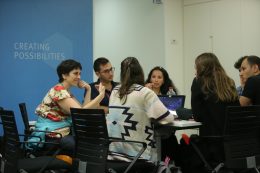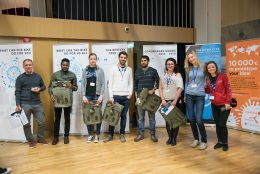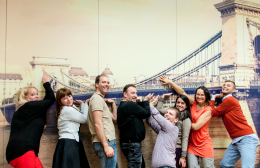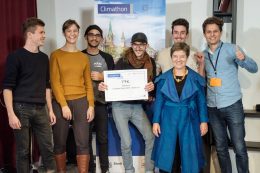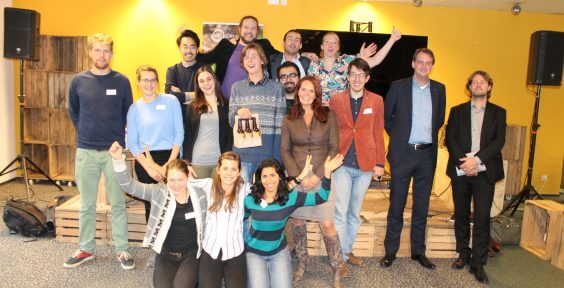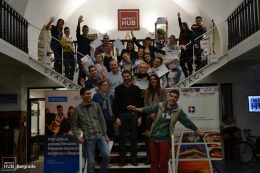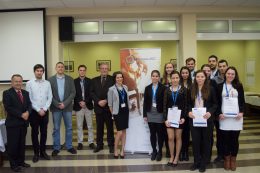30 Winning Solutions That Could Change the World
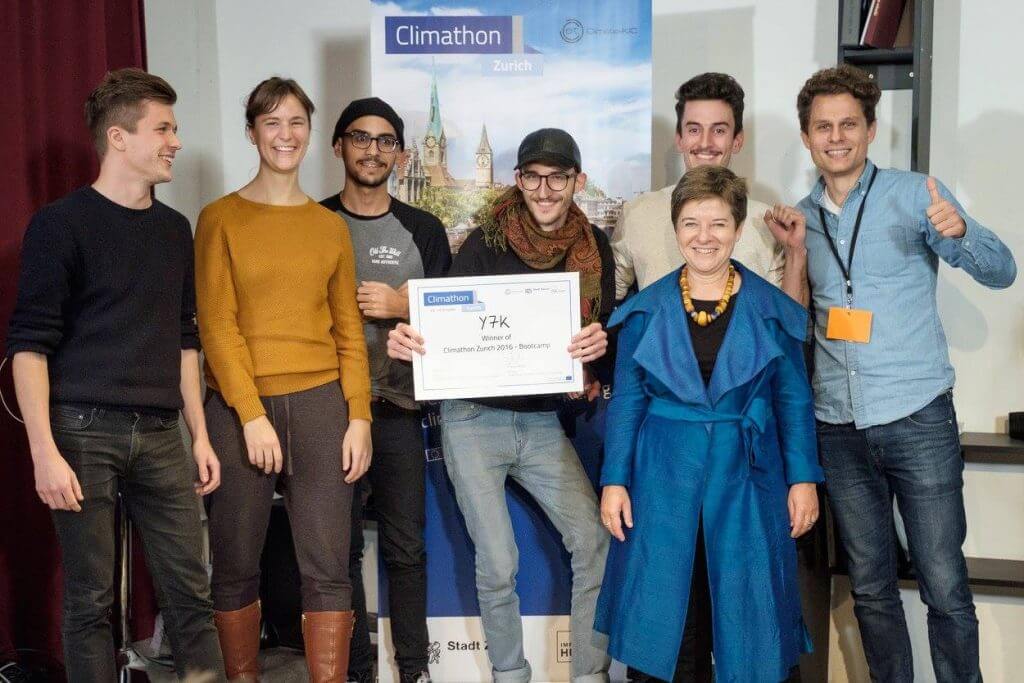
On the 28th October 2016, 59 cities from around the world took part in Climathon, a global 24-hour hackathon-style event that aims to solve cities climate change challenges.
Each city that participates in Climathon sets up its own local climate change challenge that reflects what affects urban life the most. These challenges can focus on anything from air pollution, waste management or transport.
Of each city that rose to the Climathon challenge, innovative ideas were born to help solve the global climate crisis. Here are 30 of the best winning solutions to come out of Climathon this year.
[xyz-ihs snippet=”Climathon-2017-CTA”]
1) Sydney, Australia
There is no doubting that electronic cars are better for the environment than cars that rely on fossil fuels. Not only do they release less emissions, but they also don’t demand that the earth be rigged in order to keep them running. So, why aren’t more people using electric cars? While petrol and diesel fueled cars are more damaging to our planet, they also are a lot more convenient to have, with a fuel station always close by. In Sydney, a company named ParkSpark are encouraging more people to opt for electric vehicles by offering citizens the chance to turn their driveway into a charging point for electric cars, which they will in turn make money off of.
Well done to the team on ParkSpark on accelerating EVs in Syd. #Climathon pic.twitter.com/d9XJJfDWEA
— Monica Richter (@RichterMonica) October 30, 2016
2) Herzliya, Israel
Trying to get citizens to change their normal transport routines can be hard. In Herzliya, like many other cities, more and more citizens are being encouraged to use public transport instead of private cars. One way of doing this would be to create an app that identifies the travel needs of the community, which would then materialize as a shuttlebus for school children and parents. To encourage people to actually use the app and shuttle bus, a gamification software will be used within the app, making public transport more enjoyable for everyone.
3) Malmö, Sweden
Like many cities, Malmö is a melting pot of different cultural, religious and ethical backgrounds. In fact, over 30% of Malmö’s population is made up of foreign citizens, and there seems to be a gap between them and the local Swedes. In order to get everyone to form together as one community, Co.Malmö, the city’s Climathon winners, propose a new membership system, whereby people can make use of previously empty ‘common areas’. By renting these on an hourly basis, less power would be needed to maintain the facility, meaning that less emissions will be released into the environment. Not only this, but these common areas will be an ideal location for pop-up stores to sell locally produced goods; good for the society and the environment.
Malmö #climathon winners of 2016: CO-MALMÖ! 👏🏻 @CKICNordic @malmostad pic.twitter.com/2ocmaT5JY7
— Maja Krowicki (@Majakrowicki) October 29, 2016
4) Tallinn, Estonia
While many citizens want to ride their bike to work and back, it can sometimes be that the suggested and quickest route is too noisy and dangerous, making the whole experience unenjoyable. Smyckling, Tallinn’s Climathon winners, plan on designing a biking app that will take users the quietest and most enjoyable route, in an attempt to make the pastime more enjoyable.
5) London, UK
In London, air pollution is the one of the city’s biggest worries. It is clear that what the city needs is a mass air cleansing- but how? London Climathon winners, FiltAir, came up with the innovative idea of attaching pollutant filters to London buses, which will travel all over the city, all day long cleaning up the air quality in the city. FiltAir estimate that this method will take out 99% of pollutants in London’s air.
I can’t believe we just won the London #Climathon from @ClimateKIC with our proposal to improve its air quality. Well done to all the teams! pic.twitter.com/e3TODLgBHY
— Daniel Navarro (@danielnavarrob) October 29, 2016
6) Dublin, Ireland
Transport is one of the world’s biggest contributors to the pollution levels, which is why so many counties and cities are trying to encourage more and more people to use transport in a more economical way. In Dublin, a company called CitySwifter has been set up which is a luxury public transport service that offers short commute times and free Wi-Fi onboard, meaning that you can relax or carry on working on your commute while also reducing your CO2 footprint.
We won at #Climathon Dublin! Thanks @smartdublin & @SusNatIrl for organising such a successful event! #cityswifter pic.twitter.com/PHze0Ifr7U
— CitySwifter (@CitySwifter) October 28, 2016
7) Budapest, Hungary
When you’re trying to find a parking space in a city center it can be a nightmare. Instead of being able to easily park, you spend half of the time driving around to find an available space, all the while releasing more harmful CO2 gases into the environment. Instead of this, SPARKS team from Budapest propose an app that identifies vacant parking spaces through the use of smart sensors.
8) Birmingham, UK
Festivals have long been a favourite pastime of people all around the world. Whether it be a music festival, film festival or religious festival, research shows that a large demographic of people go to at least one festival a year. So, why not have a health festival, too?
WellFest, the winning idea from Birmingham Climathon, is a festival of wellbeing for people and the planet. If people take good care of themselves by eating in a healthier way and exercising more, they are also taking better care of the planet. WellFest tests festival goer’s health and habits with a range of fun activities, and then depending on results they will be advised how to fill their lives, and the planet, with a little more good.
And the @innobham #Climathon winners are… Team WellFest!
Congrats guys! 👏😄 pic.twitter.com/gsop3Jl4rn— Ian Graham (@IanG_York) October 28, 2016
9) Melbourne, Australia
City centres are full with digital screens promoting all of the latest advertising campaigns; but why not also use these screens for something more important?
Melbourne’s winning team, State of Power, proposes that digital screens around Melbourne and other Australian cities should show power consumption and sustainability scores by state. A corresponding app can then direct users to more information regarding their own power consumption, which in turn could spark a national conversation and sustainable revolution.
And the winners are… State of Power! For their #creative @FedSquare rollout. What a good looking bunch of #Melbourne peeps. #Climathon pic.twitter.com/IW1I8vNpbT
— Michelle Mannering (@MishManners) October 29, 2016
10) Chennai, India
In India, 30% of the population have not been provided with electricity. In order to generate electricity, these citizens need to emit smoke which is known as flue gas. But, if you were to capture this gas from places such as thermal power plants using microalgae, you would achieve zero smoke discharge, as the gas would serve as food for the algae. This was the winning idea of team C2C in Chennai, India. In fact, not only would this solution be more climate friendly, but the fully cultured micro-algae could then be sold to cosmetic, agricultural or wastewater industries, which in turn would boost then present economic benefits. Since the Chennai Climathon, the team have also attracted European investors.
#climathon #chennai Carbon2Cash wins it. Take carbon from emissions and make cosmetics with it.
— Prem Manikandan (@dudemachan) October 29, 2016
1 of the teams who participated in the #Climathon Chennai has attracted investors. @retheenk @ClimateKIC_DE @ClimateKIC
— Prem Manikandan (@dudemachan) November 24, 2016
11) Krakow, Poland
Traffic dominates much of Krakow city, especially in high tourist areas. By closing off certain highly populated areas to motor traffic and replacing it with pedestrian lanes, bike lanes and green infrastructure, the city becomes less polluted and more pedestrian friendly. The Krakow municipality has agreed to implement this plan in 2017.
#Climathon Krakow has its winners-AAP group working on old town traffic problem pic.twitter.com/gRDoLUgzxc
— Climate-KIC PL (@ClimateKICPL) October 29, 2016
12) Zurich, Switzerland
Sometimes, it’s hard to know what we can eat to make our diets more climate friendly. However, thanks to Max, it has never been easier. Max is a personal foodie-bot that gives you recommendations on what and where to eat to reduce your carbon footprint, meaning you can save up to 100,000kg of CO2 emissions. Max will even take into account any dietary and allergy requirements, too, as well as sending you seasonal recipes and giving you advice on what to do with your leftovers!
13) Vijayawada, India
Litter is both bad for the planet and horrible to look at. As a way of cleaning up the streets of Vijayawada, the winning Climathon team for the city thought of a mobile app to track waste litter and provide sanitation through the immediate cleaning of litter. This process would also ensure that the litter is correctly disposed of and recycled where possible.
Moments from our Global #Climathon event at KL University in Vijayawada where 24 teams participated in tackling the challenges of tomorrow. pic.twitter.com/EzYiAfpbSy
— 10,000 Start-ups (@NASSCOMStartUps) November 14, 2016
14) Bogota, Columbia
When heavy, intense rains hit in Bogota, the sediments from the local mountains are washed onto the roads and therefore the sinks, which are also full of litter as locals throw their trash into canals. This means that not only are the sinks not very sanitary, but they also collapse in flood events.
There are two ways this issue and reduce the magnitude of flood events in Bogota. The first is to develop technical information about the weather and climate conditions of the city, taking into account past and present climate tendencies or scenarios in the future. The second solution would be to work closely with people in the community and teach them of climate change topics, especially its effects and consequences, and how to take better care of the environment and planet.
15) The Hague, Netherlands
Part of the reason that people don’t recycle is maybe because they don’t know how much waste is produced in a city on a day to day basis, or what can be done with that waste. Team Afvallei feel that making a waste experience park, that shows people how much waste is produced a day and what can be done with it, would encourage people to be more responsible with their waste to make for a healthier and more environmentally friendly city.
16) Valencia, Spain
Water is something that is easily wasted in modern Western society, as is electricity. In fact, showers are one of the biggest wasters of water in your home (but that is not to say that they are not necessary). Valencian Climathon team, VALENSUN, propose using a thermal water tank and solar panel to provide hot water for the user’s shower. At the same time as this, the shower will divert the initial flow of water that would normally be wasted. By using this product in just one third of Valencian homes, 1.8M tCO2 eq will be reduced in the first three years, and enough water to fill 15,000 residential swimming pools will be saved.
#ValenSun, un dispositiu q estalvia i reutilitza l’aigua de la dutxa amb energia solar, ha sigut la idea guanyadora de #Climathon #València pic.twitter.com/RW4MDHEB59
— Ajuntament València (@AjuntamentVLC) October 31, 2016
17) Warsaw, Poland
Some reasons that people don’t often use public transport could be that they are unaware of delays and transport timetables, and so it would be easier for them to just use private transport instead. However, team Super Star from Warsaw propose creating an app that will provide users with information about delays and public transport schedules. More than this, the app will allow users to find out about available bike shares, available parking spaces and even allow them to purchase a ticket online. The app will be user friendly for foreigners and the blind with a feature that allows you to choose a language and voice messages. Additionally, users can connect the app to an interactive panel which will use the same interface as public transport companies so that they can obtain additional information.
18) Vilnius, Lithuania
The amount of electricity that we use in our homes is a large contributor to pollutants in our environment and global warming, which is why communities are encouraged to be more energy efficient. As a way of encouraging and educating citizens on energy efficiency, the winning Vilnius team came up with the idea of E’ntanas.
E’ntanas is a chatbot service that helps users manage their electric appliances at home as well as giving advice and tips on energy efficiency queries, making users eco-friendlier and saving them money on energy costs.
19) Torino, Italy
In Torino, there were two winning Climathon ideas that aim to reduce waste in the Italian city. The first idea focused on the reduction of food waste, which involves the testing of a regional platform for the need of supply and demand of food scraps. As well as this platform, the team, ‘Preferably Today’, also propose a new restaurant for “edible wastes” be set up in local centres for citizenship involvement.
The second winning idea of the Torino Climathon was from team ‘Oikos’, who wish to promote the reduction of disposable food packaging for fruit and vegetables sold in local markets, through a system of cassette sharing and reuse. Currently, the local Torino fruit and vegetable producers use disposable packaging which are then sold on to retailers, which then become waste. It is estimated that this contributes to 55,200 tonnes of waste. To solve this waste issue, ‘Oikos’ propose using reusable and folding boxes made of virgin polypropylene, the same as they do in chain supermarkets.
@EnvironmentPark @TSInnovation OIKOS pic.twitter.com/eoJf2VrbS5
— Pamela Ragazzi (@pamr83) October 28, 2016
20) Toronto, Canada
Perhaps the most simplistic solution to help save the world was thought up by Canada’s winning Climathon team, HotPopRobot, who simply proposed that the world should plant more carbon absorbing trees. Using a home-built infrared pollution sensor, the team calculated emission levels in Toronto. Then, using the data that was found, they could then calculate how many trees would need to be planted to bring down carbon levels to an acceptable number.
The Toronto #Climathon‘s 1st and Climate Hero prizes go to the young & brilliant #HotPopRobot‘s emissions research and surprising solution! pic.twitter.com/8Z4Iog1kcN
— MaxQ (@MaxQAccelerator) October 29, 2016
21) Belgrade, Serbia
Students aren’t often regarded as the cleanliest of beings. According to Belgrade’s winning team, Eko Gnezdo, there is an excessive amount of waste in student dormitories, which not only make for an uncomfortable living area, but when this waste does get cleared away, it is not being done so in an environmentally friendly way. It is clear that what students need is an education on waste management to avoid this issue.
Furthermore, during the nighttime student dormitories are lacking warm water. For this, Eko Gnezdo feel that the best and most sustainable solution would be to provide students with a solar panel made of reused cans. Both of these solutions will give students a more enjoyable University experience.
22) Venice, Italy
How do you reduce the heat island effect in a city that is built on over 100 small islands? Well, believe it or not, you build more small islands. ‘Float green à porter’ is an idea born out of a combination of adaptation, mitigation and sociability- floating and modular islands that will reduce the heat island effect in Venice by adopting nature based solutions, like using trees on the islands to create more shade. Not only will the islands help towards a more climate friendly Venice, but they will also encourage citizens to be more sociable.
23) Trondheim, Norway
With Trondheim also focusing on encouraging citizens to have an eco-friendlier approach to transport, the idea of Toll Trolls was born. Toll Trolls wish to implement a smart road-toll system using anonymous traffic data to detect how much and where people are using private cars, so that they can charge drivers in a fairer way. Toll costs would act as an incentive to avoid using private cars and to avoid driving in the inner city.
Did we mention that the winners met yestrday, r from 4 different countries + now r close friends? #Climathon @Trondheim @NTNU @Technoport_ pic.twitter.com/UE3v5Hxwym
— Climathon Trondheim (@ClimathonTrheim) October 29, 2016
24) Shanghai, China
In China, air pollution has the greatest impact on the city’s citizens health. It has become the most critical livable indicator of residents satisfaction in major Chinese cities, such as Shanghai, Beijing and Guangzhou. This is why Shanghai chose to focus their Climathon on air quality and pollution.
The winning solution to come of the Shanghai Climathon, was to recycle abandoned electronics. Residents and students tend to abandon used electronics. which is damaging to the environment and air quality as rather than recycle these products, they get left and more, new products are bought in. By recycling these abandoned goods, is that it will have a tremendous propaganda effect on green initiatives.
25) Debrecen, Hungary
According to the winning Debrecen Climathon team, making public transport easier and more comfortable to use is the way to make Debrecen a more sustainable city. By making bus stops out of prefabricated components, which would lower the cost of installation and maintenance, the stop would also be warm in the winter and cool in the summer. Further to this, Internet access will also be installed in bus stops, making the experience of public transport much more enjoyable.
The winning team also propose to make public transport cheaper for young people, easier to use for the disabled, easier to transport bicycles and to use alternative fuels and engines with lower emissions on buses.
26) Berlin, Germany
No matter how full or empty your trash can is, the collection for it will come regardless. This means that even though your trash can may have plenty of room in it to last for another week, the waste disposal team will continue to release more emissions into the environment and waste time collecting it. However, according to The Expendables, what would fix this issue would be if bins used a sensor technique to determine how full or empty they are, which would allow waste management companies to arrange pick up times for them to save time and improve logistics, as well as reducing the amount of emissions that they release.
Wohoooo! Final Pitches at #Climathon #Berlin | @ClimateKIC_DE @TUBerlin @VeoliaDE @BSR_de #SmartCityBerlin #BerlinStartups pic.twitter.com/LAapCSXqdI
— Berlin Partner (@BerlinPartner) October 29, 2016
27) Puebla, Mexico
Like many organisations, businesses and schools in Puebla have to keep some paperwork for a few years before they can get rid of it, which means that dead files are stocked up before they are disposed of. What team Blivo propose is that they set up a service to appropriately and responsibly dispose and recycle these files, transforming it into a mixture of white liquid glue, water and paper which will be used to design and produce eco-friendly furniture.
Done with the first round, everything went perfect, thanks for everything #Climathon #BioReDesign #Puebla
— Sunny side up (@UsernameLalo) October 29, 2016
28) Frankfurt, Germany
Winners of the Frankfurt Climathon, #mygreenchallenge, aim on setting a series of social media climate challenges that spread across four weeks, one challenge per week. Challenges will be focused on mobility, meat-free diet, water saving and one challenge of the user’s choice. Challenges are set to start on Earth Day on the 22nd April 2017.
#mygreenchallenge wins #climathon in #Frankfurt congrats!
— Labl.FRANKFURT (@LablFRANKFURT) October 29, 2016
29) Leeds, UK
In Leeds, a third of carbon emissions are caused by domestic energy consumption, which substantially contributes to GDP loss in the city. Leeds Climathon winning team ‘Project Revolver’ have developed a solution to retrofit current housing stock in Leeds, which will be financed through a revolving fund and repaid under a “Council Tax premium adjustment”. This solution will not only improve domestic energy efficiency, but it will also improve living standards of current residents and generations to come.
LIVE on #Periscope: #Climathon #Leeds Presentation: Project Revolver https://t.co/lsECtrDvk5
— The Priestley Centre (@PriestleyCentre) October 29, 2016
30) Timisoara, Romania
There is no doubting that old buildings add character and charm to a city. But, the only issue with them is that they are not very energy efficient, and often let out heat that is put into them, but, when this issue is fixed, the building loses features of its character.
However, the winning team from Timisoara may have found a solution for this problem and propose that classic roof tiles are made with solar cells. This will provide a more sustainable energy solution for the owners of old buildings, while also ensuring that the energy stays inside the home.
#Climathon After 24 hours, Timisoara have 1 conclusion: 4 great ideas wins the Marathon. Thanks to organizarea and participants! pic.twitter.com/urLP0dmSbv
— ClimathonTimisoara (@climathontimis) October 29, 2016
[xyz-ihs snippet=”Climathon-2017-CTA”]

